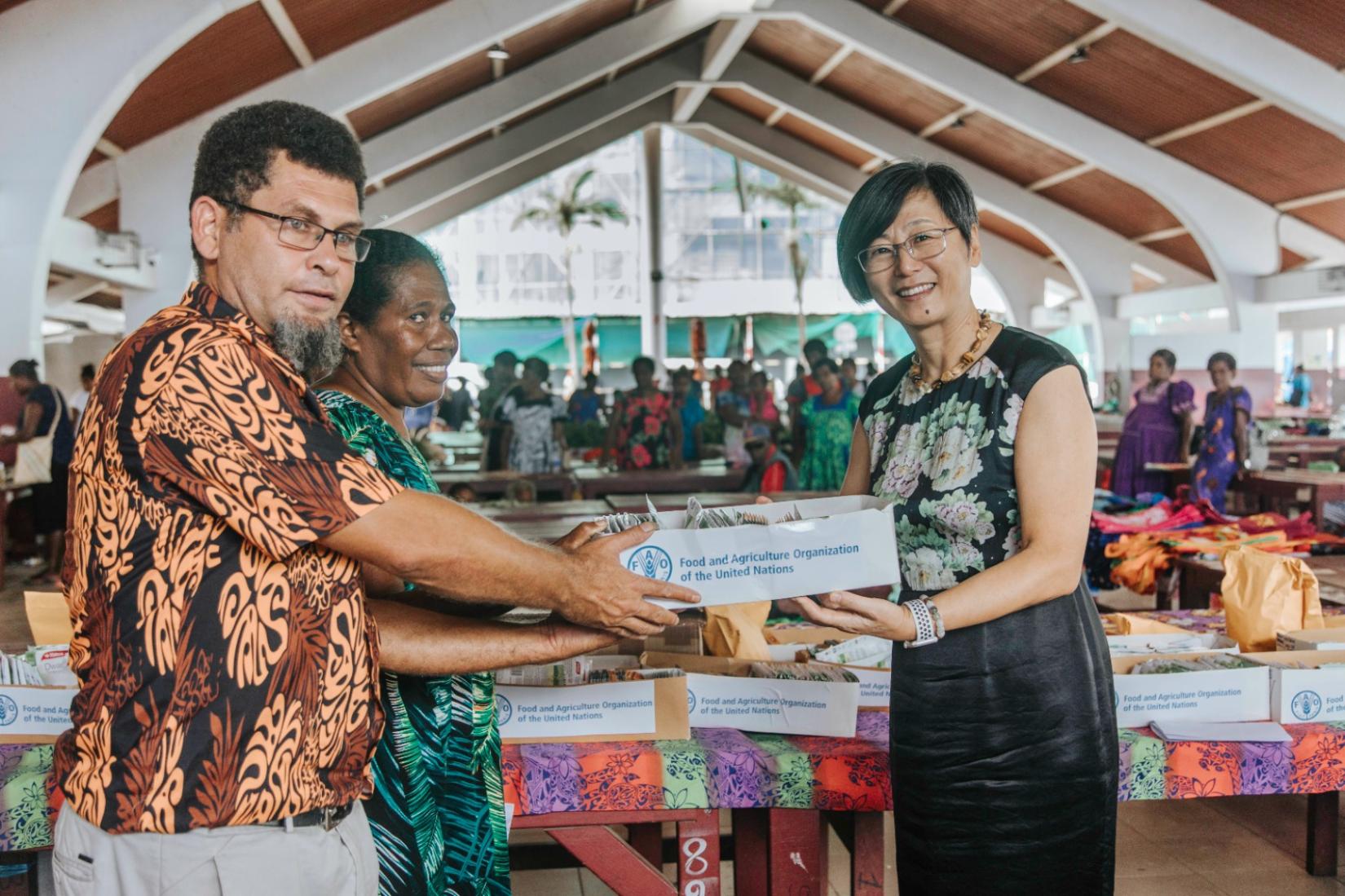Restoring Vanuatu's agriculture sector: FAO delivers tangible results breathing life into Tongoa Island's agricultural landscape
28 June 2023

In an unprecedented occurrence this year, Vanuatu experienced the wrath of Tropical Cyclone Judy and, barely pausing for breath, was immediately struck by Tropical Cyclone Kevin within a mere 72-hour timeframe. This rapid succession of cyclones magnified the devastation inflicted upon the island nation, exacerbating the already significant damage caused by the initial storm.
During this whirlwind period, the agriculture sector in Vanuatu bore the brunt of the destruction. The back-to-back cyclones wreaked havoc on crops, livestock, and agricultural infrastructure, intensifying the challenges faced by the country. The immediate impact was severe, with farms and agricultural communities grappling with extensive losses and damages.
Amidst this impact, the Food and Agriculture Organization of the United Nations (FAO) swiftly mobilized its resources to support Vanuatu in its time of need. Recognizing the urgent requirement for assistance, FAO allocated an additional USD 900 000, including USD 500 000 UN's Central Emergency Respond Fund (CERF), funding, and reallocated USD 952 800 from Global Environment Facility (GEF) projects fund, resulting in a total funding commitment of USD 1.9 million. This financial backing was channelled towards immediate cyclone response and recovery efforts, already providing much-needed aid and relief to affected communities.
Collaborating closely with the Food Security and Agriculture Cluster (FSAC), FAO, UN Women, and United Nations Development Programme (UNDP) facilitated the distribution of 24 000 packets of seeds to the impacted areas.
Under GEF funding, noteworthy progress has been made in Tongoa Island. Three agroforestry nurseries have undergone rehabilitation, breathing new life into the island's agricultural landscape. The fruits of seed distribution efforts will be realized in just two weeks, as the first harvest of dwarf beans, cucumber, tomatoes, lettuce, and carrots is expected to be held. This upcoming bounty will not only satisfy local demands but also contribute to the broader goal of achieving Vanuatu’s food security. Additionally, 500 cassava seedlings have been distributed, further diversifying the island's agricultural production.
Within the bustling streets of Port Vila, Lilly Matai from the Etas community talked about the success of FAO's seed distribution. With gratitude, she shared the news of thriving sales for various vegetables grown from the distributed seeds. Chinese cabbage, carrots, Dwarf Beans, and soon-to-come eggplants and zucchinis have become vital staples for their community. Lilly noted: "It is great to hear about the success of these vegetable sales and the positive impact they may have on the community. It is important to continue supporting initiatives like this that promote access to healthy food options. We appreciate the efforts of FAO and your association in distributing these seeds and promoting sustainable agriculture practices."
Meanwhile, Jane Sola, residing in Teuma, Port Vila, shared how the support received from FAO had significantly enhanced their backyard gardens. She said: "The backyard gardens have been improved with the support received from FAO. Tools and seeds provided by FAO have been instrumental in helping us overcome the effects of the two cyclones."
The primary objective of these initiatives is to enhance the agricultural productivity of Tongoa Island while fostering sustainable farming practices. By equipping local farmers with the means to cultivate a wide range of crops, FAO aims to improve food availability, promote self-sufficiency, and ensure long-term resilience against external shocks.
Furthermore, FAO extended crucial support to the Ministry of Agriculture, Livestock, Forestry, Fisheries, and Biosecurity (MALFFB) during the Post Disaster Needs Assessment, ensuring a coordinated and comprehensive approach to addressing the challenges faced. Looking ahead, FAO's strategic response plan is designed to cater to the long-term needs of Vanuatu's affected population. Over 26 000 beneficiaries will be provided with essential resources, including seeds, seedlings, agricultural and livestock tools, inputs, and cash assistance. This multifaceted support will empower individuals and communities to resume agricultural activities and mitigate the impact of the cyclones on their livelihoods.
FAO will also introduce cash distributions, targeting at least 800 households in the worst-hit areas of Vanuatu. This innovative approach aims to enhance the speed and efficiency of aid delivery, ensuring that assistance reaches those in need promptly and directly.
Even with FAO's and other partners’ efforts, the scale of the challenges faced by Vanuatu remains immense. The total funding required for an effective response and recovery stands at USD 3 million, leaving a significant funding gap. FAO's current resource partners have played a vital role in providing the necessary financial support thus far, making a significant impact on the affected communities. However, the road to recovery for Vanuatu remains long and arduous. Nestled amidst the vast expanse of the Pacific, Vanuatu and its remote islands pose a persistent logistical challenge. This challenge is further amplified as the nation embarks on nation-wide distributions of dry rations, extending aid to some of the lesser impacted communities. The intricate task of navigating the geographical barriers in this region adds complexity and costs to the operations.
FAO calls upon the international community to continue extending their assistance, recognizing the vital role that agriculture plays in the lives and well-being of the people of Vanuatu. With dedicated support, Vanuatu's communities can overcome the challenges they face, restore their agricultural livelihoods, and build a resilient future for themselves and generations to come.





